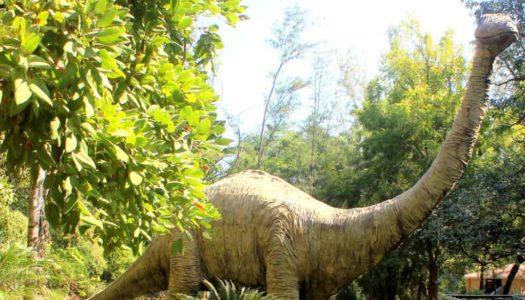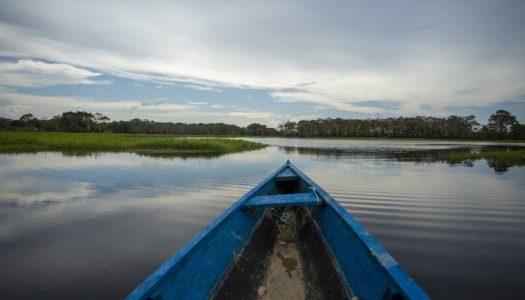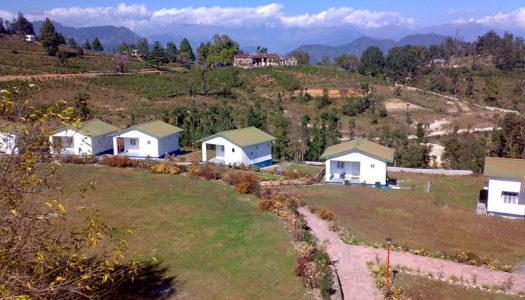Stories of war, royalty and love reside in the small corners of opulent palaces in India. Palaces in India narrate the rhythm of grandeur and regality of the past. Whether it is the Peshwas of Pune or Nawabs in Hyderabad, every palace exudes vibes of architectural excellence.

The palaces are not limited to only viewing. You can visit all of them to observe the creativity and collaboration of artisans! With Treebo hotels everywhere, you seriously do not have to worry about budget-friendly accommodation. So, check out the blog to explore the finest palaces that have tales of emperors, queens and so much more!
25 Palaces in India: Where Craftsmanship Meets Elegance
1. Umaid Bhawan Palace, Jodhpur
Umaid Bhawan Palace is one of the lavish palaces in India known for its Indo-Saracenic architecture. In today’s time, the palace serves as the residence of the royals. With a fusion of Renaissance and Art Deco styles, the palace was built by the famous architect Henry Lanchester.

The palace also has a museum showcasing vintage cars, paintings and ancient artefacts. A sprawling garden allows you to capture Instagram-worthy pictures. With the best hotels in Jodhpur, you can easily enjoy a great getaway.
2. Taj Lake Palace, Udaipur
Floating on the serene waters of Lake Pichola, Taj Lake Palace is a breathtaking beauty. It was built by Maharana Jagat Singh II as a summer retreat. As you stand by the shore, you can get an awe-inspiring reflection of the palace.
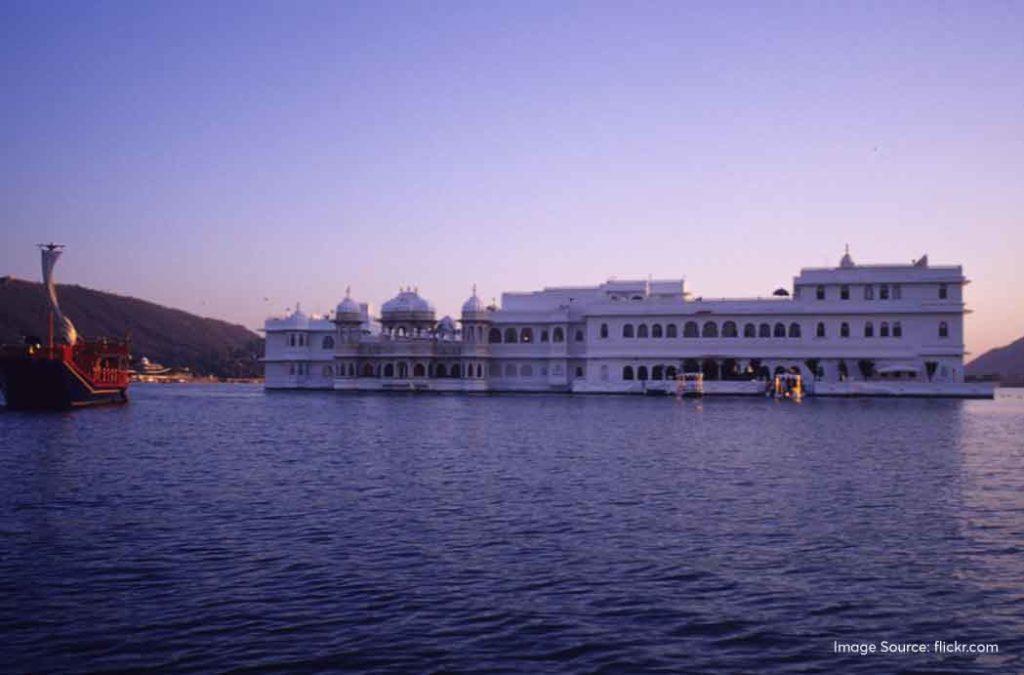
Intricate chattris, domes and white marbles make it a place of glamour. Encapsulate the beauty of Mughal and Rajput styles here. It is indeed one of the regal palaces in India showcasing the exclusivity of architecture and detailed interiors.
EXPLORE THE MAGNIFICENCE OF THE CITY OF LAKES WITH THIS 2-DAY UDAIPUR ITINERARY
3. Mysore Palace, Mysore
Popularly known as the Amba Vilas Palace, Mysore Palace is one of the significant palaces in India. Witness the commendable Indo-Saracenic architectural style. The palace belongs to the Wodeyar Maharajas of Mysore. Built in the early 20th century, look at the intricate interiors and ornate ceiling.

Do not miss visiting during the Dussehra festival as the palace is illuminated. The palace also has a golden throne, a marriage hall, a Durbar hall and other rooms defining the lifestyle of Maharajas. You can easily book affordable hotels in Mysore near the palace for a comfortable stay.
4. Amber Palace, Jaipur
Your trip to Jaipur remains incomplete without visiting the famous Amber Palace! Locally known as the Amer Fort, this palace is located on a hilltop. It was built by Raja Man Singh I during the 16th century.

It has a courtyard and different gateways for the public and the private audience. As you dive into the royal lifestyle of the Rajputs, do not miss taking pictures of the Maota Lake from the top. Check out amazing hotels in Jaipur for great deals on booking.
5. Bengaluru Palace, Bangalore
Here is your chance to witness the exclusive Tudor-style architecture. The Bengaluru Palace is an architectural gem in the heart of Karnataka. Built by King Chamaraja, it is known as the summer residence of the royals. It has an exclusive collection of Victorian and Edwardian furniture.

Take a stroll in the lush gardens and watch the fortified towers. The Western influence allows you to see a combination of exclusive chandeliers in a traditional Durbar hall. The palace hosts various cultural events and exhibitions so you can always be a part of it! Finding a stay? Here are affordable hotels in Bangalore for all budgets.
HAL AEROSPACE MUSEUM BANGALORE: A TRIBUTE TO INDIA’S MAGNIFICENT AERONAUTICAL HISTORY
6. Cooch Behar Raj Palace, West Bengal
Known as the Victor Jubilee Palace, the Cooch Behar Raj Palace is a historical structure in West Bengal. It is one of the best palaces in India that stands as a testament to classical European architecture. You can see a combination of Renaissance and Greek influences here.

The symmetrical layout also has a green garden, Durbar hall and a Nata Mandir for religious performances. The palace also has a museum with an exclusive collection of photographs and items belonging to the royal family.
7. Ujjayanta Palace, Agartala
Palaces in India have different stories to narrate. One such is the Ujjayanta Palace belonging to the Tripura Kings. Located in the northeastern state of Tripura, the palace is known for its impressive domes and Mughal Gardens.

The palace has many galleries where you can see an expansive collection of sculptures and vintage documents. The tranquil atmosphere makes it one of the best destinations for history. The palace is now converted into a museum reflecting the cultural heritage of the state.
8. Laxmi Vilas Palace, Vadodara
The city of Vadodara shines with the glory of the famous Laxmi Vilas Palace constructed by Maharaja Sayajirao Gaekwad III. Surprisingly, the palace is four times larger than Buckingham Palace in the United Kingdom! What makes it attractive is the usage of Venetian mosaic floors and stained glass windows.

It has royal apartments, well-manicured gardens and whatnot! The palace stands as a testament to the Gaekwad dynasty showcasing the cultural richness and legacy of Vadodara. Check out the best hotels in Vadodara near the palace for a great getaway.
DON’T OVERLOOK THE 10 MOST POPULAR WEEKEND GETAWAYS NEAR VADODARA
9. City Palace, Udaipur
Udaipur is home to luxurious palaces in India and City Palace is one of them! Located on the banks of Lake Pichola, witness the grandeur of Rajput architecture. The City Palace showcases a blend of European and Chinese architectural styles. It also reveals Rajasthani and Mughal influences in architectural elements.

Built by Maharana Uday Singh II, the strategic location allows you to witness the city and Lake Pichola. It has a peacock courtyard featuring a mosaic of peacocks. The place has royal costumes taking you back to the bygone era. See the famous Light and Sound Show held during evenings.
10. Jal Mahal, Jaipur
As the name suggests, Jal Mahal means Water Palace of Jaipur. The palace was constructed right in the middle of Man Sagar Lake by Maharaja Madho Singh I. While it appears that the palace is floating, it is the strategic structure that creates such an illusion.

Made with red sandstone, the palace outshines when the sunlight hits the exteriors. It is built in a Rajput style showcasing the craftsmanship of the artisans. While you cannot explore the interiors, the illuminating reflection in the water creates a magical ambience right in the middle of the lake.
11. City Palace, Jaipur
Just as Udaipur has a City Palace, Jaipur also has a palace in a similar name. Built by Maharaja Sawai Singh, the City Palace of Jaipur is one of the exclusive palaces in India. It has a series of courtyards, buildings and gardens. Walk through the beautiful structures known as Chandra Mahal, Mubarak Mahal and Govind Ji Temple.

The architectural features of the palace speak highly of the Rajasthani culture and traditions. It has a collection of weapons too! There are different halls for private and public audiences and detailed marble work. It is also one of the famous palaces in India for vibrant photography options.
A VISIT TO THE ‘PALACE OF WINDS’: HAWA MAHAL IN JAIPUR WILL LEAVE YOU SPELLBOUND
12. Jagmandir Palace, Udaipur
Witness the grandeur of Maharana Karan Singh at one of the best palaces in India. Jagmandir Palace is situated on the Pichola Lake elevating your time. You can see a Mughal-inspired architectural style. The palace has a Gul Mahal featuring domes and pillars.

Walk through the sprawling courtyard on the black and white tiles. The remains of the royals can be found here. In today’s time, the palace is converted into a heritage hotel. However, you can visit this place to watch the regality of Udaipur.
13. Hawa Mahal, Jaipur
The city of Jaipur welcomes you to witness the iconic Hawa Mahal. Built by Maharaja Sawai Pratap Singh, the Hawa Mahal is one of the beautiful destinations. It is a honeycomb-like structure featuring 953 small windows.

It is believed that these windows were designed for royal women to observe the festivals while protecting their privacy. It is made in a way that provides natural ventilation thereby giving the palace its name. The Palace of Winds features a combination of red and pink sandstone with floral patterns.
14. Chowmahalla Palace, Hyderabad
The residence of Nizams exudes vibes of regality and grandeur. Chowmahalla Palace is one of the most stunning palaces in India. Nestled in Hyderabad, the huge palace has four different palaces within. Walk through the Grand Durbar Hall where ceremonies take place.

Stucco work and huge chandeliers elevate the look of this palace. The palace is open for exploration so you can see the Clock Tower and Council Hall. A meticulously planned structure like this one adds to the richness of Hyderabad.
VISIT THESE 6 BEST WEEKEND GETAWAYS FROM HYDERABAD DURING YOUR NEXT TRIP
15. Jai Vilas Palace, Gwalior
Jai Vilas Palace is a fusion of architectural styles of Tuscan, Italian-Doric and Corinthian. Being one of the noteworthy palaces in India, this palace is known for its grand chandeliers and gold furnishings. It has a massive Durbar Hall, a Silver room and a staircase of crystals.

The palace also has a museum with a vast collection of weapons and coins. The imposing gates and green gardens elevate the beauty of this royal structure. It is the official residence of the Scindia family in today’s date.
16. Tipu Sultan’s Summer Palace, Bengaluru
Built for the Kingdom of Mysore, Tipu Sultan’s Summer Palace is a breathtaking structure. The palace is known for delicate floral motifs and ornate frescoes. You can walk through the walls displaying paintings of battles and court life.

The Tiger Stripe motif is the main attraction inside the palace showcasing the personality and courage of the ruler. It also has a garden with pathways and fountains. Enjoy the tranquil atmosphere with the backdrop of the Cauvery River at one of the best palaces in India.
17. Lalgarh Palace, Bikaner
Here’s a reminder to delve into the princely destination of Bikaner. Lalgarh Palace is one of the beautiful palaces in India featuring Mughal and European styles.

Ornate balconies and filigree work define the beauty of Lalgarh Palace. It also has a Sadul museum displaying trophies and vintage items. Gardens and courtyards are perfect for photography.
10 MOUTH-WATERING FOODS IN BIKANER TO RELISH ON YOUR TRIP
18. Leh Palace, Leh
Under the blanket of the Himalayas is one of the traditional palaces in India. The Leh Palace is an absolute gem to witness Tibetan architectural style. Built by King Sengge Namgyal, the Leh Palace is adorned with ancient murals and paintings.

Leh Palace has been the residence of the Namgyal dynasty. In today’s time, the palace is partially converted into a museum. Walk through the beautiful jewellery, costumes and age-old artefacts. Watch the past of Ladakh and click pretty pictures!
19. Prag Mahal, Bhuj
Here’s a fancy palace featuring Italian and Gothic architectural styles. Prag Mahal is one of the best palaces in India designed by Colonel Henry Saint Wilkins. You can see a clock tower, marble work and huge pillars.
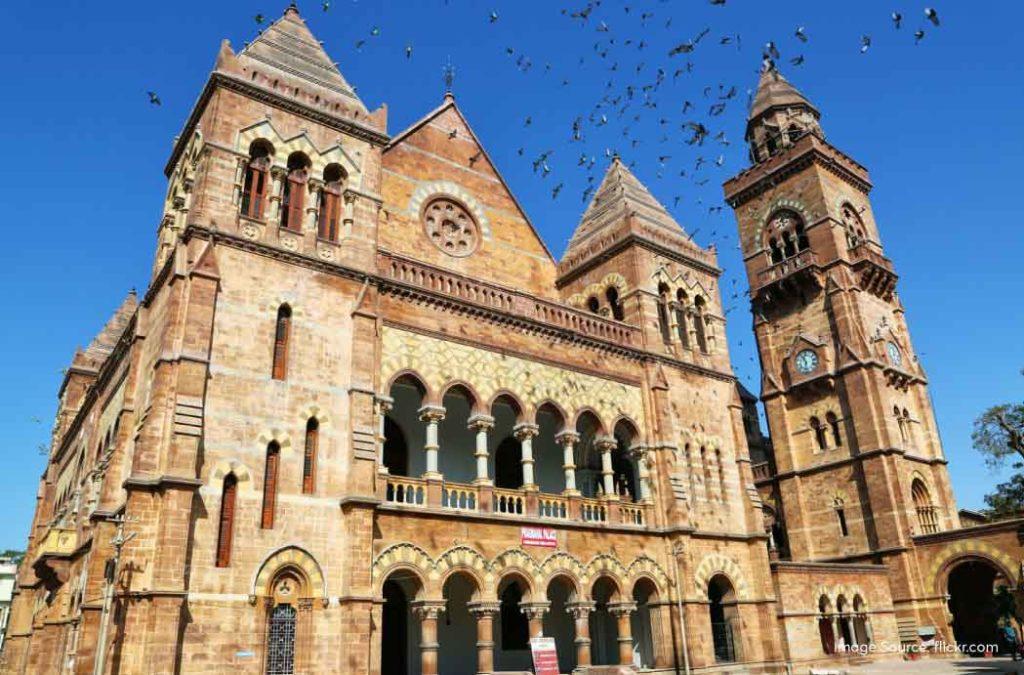
Unfortunately, the palace was destroyed in the 2001 earthquake. However, efforts have been made to restore the palace for viewing. It also has a museum featuring ancient artefacts, paintings and a lot more. Gothic elements add glamour to this palace.
20. Chettinad Palace, Tamil Nadu
Chettinad Palace truly defines the essence of Chettinad architecture and thought process. It is a testament to the community’s rich construction and skills. Italian marble and Burma teak wood embellishments make it one of the best palaces in India.

What makes this palace unique is the use of Athangudi tiles that are handmade. Do not miss noticing plush furnishings and paintings inside the palace. It has interconnected courtyards, rooms and different complexes defining the lifestyle of the Chettiars.
TEMPLES IN TAMIL NADU: THE SPLENDID DISPLAYS OF DRAVIDIAN HERITAGE
21. Mubarak Mandi Palace, Jammu
Illuminating chandeliers and expansive courtyards await your presence at one of the royal palaces in India. Mubarak Mandi Palace was built in the 19th century for Dogra kings. Located in Jammu, the palace features a huge Pink Hall known for its stucco work.

Witness a fusion of Mughal and Rajasthani architectural influences. The palace has a Darbar Hall and a Gol Ghar offering panoramic views of the surroundings. The palace is now converted into a museum showcasing paintings and ancient documents. With hotels in Jammu, plan a getaway super soon!
22. Padmanabhapuram Palace, Kanyakumari
You must have seen various palaces in India made with stones and bricks. However, Padmanabhapuram is different from all. The palace is built with wood ranging from rosewood to teakwood. The palace has carved ceilings and pillars adding to the charm of the place.

Do not miss watching the 300-year-old clock tower showing accurate time even now. The scenes of Ramayana are also painted as murals here. From wooden artefacts to brass lamps, Padmanabhapuram has everything for history enthusiasts! With the best hotels in Kanyakumari, you can easily plan a getaway here.
23. Ramnagar Fort and Palace, Varanasi
Located on the eastern banks of the holy river Ganga, Ramnagar Fort and Palace is indeed a place of beauty. This architectural gem was built by Maharaja Balwant Singh in 1750. It is one of the best palaces in India allowing you to immerse in the cultural tapestry of Varanasi.

Till today, the palace serves as the residence of Kashi Naresh (king of Varanasi). Observe the turrets, domes and intricate carvings that define the beauty of the palace. The palace is home to a museum exhibiting vintage cars and artefacts. Find hotels in Varanasi for a great time in the city.
GHATS OF VARANASI: A VISUAL SYMPHONY OF RELIGIOUS HYMNS AND RHYTHMIC WATERS
24. Monsoon Palace, Udaipur
Shining on the top of the Aravalli hills, Monsoon Palace is an architectural marvel in Udaipur. Popularly known as Sajjangarh Palace, the structure outshines due to the usage of white marble. Intricate detailing and picturesque backdrop add to the glory of this place.

It was built by Maharana Sajjan Singh and the original intent was to create an astronomical centre. The palace has also appeared in a movie named Octopussy making it a popular spot! Check out affordable hotels in Udaipur for a comfortable journey.
25. Jodha Bai’s Palace, Uttar Pradesh
Nestled in the heart of Fatehpur Sikri, Jodha Bai’s Palace is a testament to Indian craftsmanship. You can witness a combination of Persian and Hindu architectural styles. Built with red sandstone, the palace exudes vibes of sheer elegance and love.

The huge structure comprises a courtyard, ornate details, rooms and domed pavilions. The palace was built by Akbar thereby making it a scenic spot for travellers and locals alike. It is one of the underrated palaces in India allowing you to observe the lifestyle during Akbar’s reign.
Palaces in India talk highly of the luxurious lifestyle and kings and queens back then. The palaces also stand as an epitome of excellence in engineering. It is your turn to explore the unexplored as you encapsulate the stories of the bygone era.















